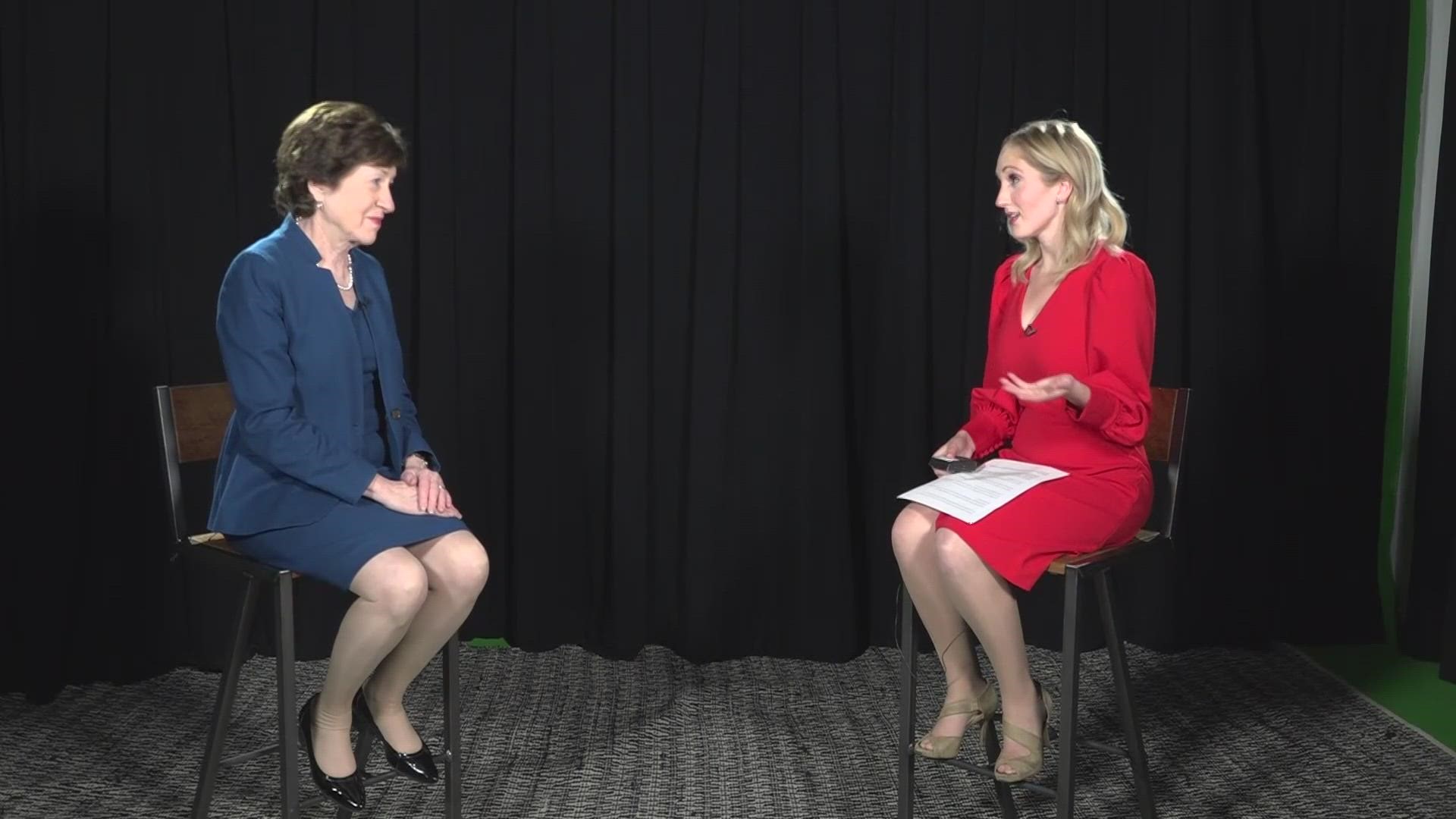AUGUSTA, Maine — When it comes to everyday conversations, Mainers generally avoid certain topics. But one of them happens to be about finances.
For many Mainers, it's seen as a virtue to be self-made, thrifty and independent. However, this narrative has complicated discussions about what it means for those who are among the traditional retirement age but still need to work. In many ways, it has presented a problem about survival.
The Maine Council on Aging estimates that more than one-third of Mainers over the age of 65 depend on income from Social Security benefits alone, without any reliance on retirement savings. That translates to roughly 102,000 Mainers. The issue is that the average person can't survive on Social Security alone, a problem that has become exacerbated by rising costs that include property taxes, health care and housing. While there is no singular cause to this financial challenge, the truth is that many people are struggling, even though they often don't want to ask for help.
Mainers' stories
Anne Heinig and Bill Millar
In a nonliteral way, siblings Anne Heinig and Bill Millar of Harpswell won the lottery.
They come from a long family history of living on the coast, inheriting the plots of land where they live from their parents and grandparents. The glistening saltwater, frosty this time of year, is visible from Millar's driveway. It's a view that would stretch most people's wallets these days, and Heinig and Millar like to joke they're not rich like folks who move to this area from out of state.
"It was all woods. You went just about anywhere you wanted," Millar said about what he and Heinig consider the "good old days."
"Now, it has become a very upscale retirement location, which has ramifications for the town as well," he continued.
Millar is 75 years old. He and his wife, Susan, have been able to retire after careful planning. He said they are "financially comfortable" because they were able to save money along the way, but his main concern for the future is the rising cost of property taxes. He said his first bill was about $400. Now, that cost is close to $5,000 or $6,000. He said it's his single largest bill.
"Our first property tax here was $400, and I thought that was obscene," Millar said.
"When I first looked at retirement, I looked at our property tax bill, and I thought, 'My gosh, that's a third of my pension," he continued.
Heinig's situation is even more challenging. Her husband, Chris, is an insulin-dependent diabetic. She's 69 years old but is still working because Medicare hasn't covered the pump Chris needs. She said they did the math together a while ago and discovered that, without her health insurance, the insulin costs would be upwards of $20,000 per year, or $1,600 per month.
"I work to take care of him because I love him," Heinig said.
She also shared that she believes she's fortunate to still be able to work — and to enjoy her job as an administrative assistant at Southern Maine Community College's Fire Service Institute.
"We live in the richest country in the world, and people who aren't in a situation like mine are either making a choice of going bankrupt or dying," Heinig said.
Heinig recently learned that Medicare may end up covering part of the cost for Chris' pump but said it's still unclear exactly what that new cost will be or whether she'll be able to retire. She had said if she could, though, she would love to travel.
"I don't have an end date. If I win the Mega Millions tomorrow, it will be tomorrow," Heinig said, smiling.
Linda Dougherty
Linda Dougherty is a single 72-year-old woman who lives in Orono. Behind her home, there's a homemade gate that shelters a flock of chickens she tends to carefully. It's an indication she likes to stay active and busy, and that's no different in work.
"When I retired from work full time, I knew that I would still have to work part time, so I made up my mind that I was no longer to tend a cash register, and I was only going to do jobs that were fun or had good benefits," Dougherty said.
Dougherty currently works at a greenhouse in Eddington from March through July. She also serves beer at Bangor Waterfront Concerts and rents out a room in her home.
She said she doesn't necessarily have to work to survive, but her Social Security check is less than $20,000 per year, and she wants to be able to have some flexibility in her spending.
"I wouldn't be insulating my attic, I wouldn't be replacing the leaky windows, I wouldn't be doing the new roof on the house," Dougherty said.
Dougherty said she does have a 401K and an emergency fund, but she gets worried about what might happen if she were to get sick, for example.
She said her finances were affected when she went through a divorce several years ago. She said she believes older women typically are more affected by this problem than men, too, because they're often the person in a relationship to take time off of work to care for children or elderly parents.
Dougherty's two children live in Glenburn and South Berwick. She said they have offered to take her in at any point in time, but that's not an option to her.
"I don’t want to be a burden to my kids," Dougherty said.
Carolyn Silvius
Carolyn Silvius is turning 75 years old in April and lives in Portland. She said she has dealt with a disability for most of her adult life after a fall on ice led to degenerative disk disease. As a result, she hasn't able to to work regularly, and was evicted in 2014.
"I could not afford a place to live," Silvius said. "Everything that I looked at or looked into was just beyond anything I had. Even with the $84 that general assistance would've provided me, I was still a couple hundred dollars a month short."
Silvius spent about 10 months in Portland's Florence House women's homeless shelter, where she celebrated her 69th birthday. She later moved to a subsidized apartment in December 2014, where she lives now. She said the elderly population is one of the fastest-growing groups experiencing homelessness, which is a problem.
"I never lost my ability to self-advocate, and most people who become homeless do," Silvius said.
What the experts have to say
Japhet Els
Japhet Els is the community outreach and advocacy director of AARP Maine. He said talking and "having enough," especially when it comes to money, can be a challenging topic for many Mainers to discuss.
"There's a certain amount of, I think, respect many of us may have for somebody who is thrifty, very efficient and lives very frugally," Els said. "As long as that is true, the definition of what is 'enough' for later in life can become a little bit of a sticky wicket."
Els said the cost of nearly everything during the pandemic, from commodities to prescriptions drugs to rising taxes to utilities, has been increasing for many Mainers, and a lot of people making tough choices about where to cut back on spending. He said a lot of seniors have decided to cut costs that range from keeping home temperatures cooler or residing in only one part of their house in the winter. Sometimes, people resort to cutting prescriptions pills in half to stretch their medications. Other times, they choose not to eat.
"There are folks we know who have to work," Els said. "The hard part about that is they don't always say that. I think the idea of being painted as a person who has to work later in life is not a label that many people want to have to talk about."
Els said about 45 percent of the members of AARP continue to work, but whether that's because of need or want is a difficult to calculate. He said an important part of this conversation includes talking to younger generations about savings, explaining that ideally, funding retirement will happen through a three-legged stool model: a pension or a 401K, personal savings, and Social Security.
"When we talk to folks who are in their seventies or late 60s, they will say, 'If I could talk to my 21-year-old self, this is what I would say: 'Save your damn money.''"
Susan Collins
U.S. Sen. Susan Collins sits on the Senate Special Committee on Aging. She has said Maine is the oldest state in the nation. There's a disproportionate number of seniors, and they're living longer. She said in many ways, that's a positive story — seniors are healthier and engaged in our workforce with a sense of dignity and reward. But some people are working solely to survive.
"I don’t think we have those conversations very often, and we really should because it can make such a difference in your older years, between being comfortable and worrying about how you’re going to pay your bills, have enough to eat, and keep warm in the winter," Collins said.
She said delaying retirement can actually make a big different in the amount people get from Social Security — as much as $1,000 more per month, in some cases — and the Social Security retirement age is higher than it was at 66 or 67 years old. She said the Social Security trust fund is running of out money, though, and believes it's important for people to look at different means of financing their later years.
"One of the steps that I'd like to see taken is for local school systems to consider offering seniors in high school a course in financial literacy," Collins said.
She also shared that there's an idea circulating in Congress about automatically enrolling people in a retirement plan unless they choose to opt out of it.
As for what we can do every day to help, it's about trying to have open and honest conversation.
"We need to look out for our neighbors and make sure that people are OK," Collins said.
Initiatives to help
LD1622
Maine Sen. Eloise Vitelli is the sponsor of LD1622, An Act To Promote Individual Retirement Savings through a Public-Private Partnership, which was signed into law during the last session. It's more commonly known as the "work and save bill" and is designed to automatically take a percentage of someone's earnings directly from their paycheck and put it into a Roth IRA. The account goes with the individual from job to job until they retire.
"Studies have shown that people are 15 times more likely to save if it's offered through their employment," Vitelli said.
She said this bill was modeled on legislation that already exists in other states.
People must opt out of the program if they don't want to participate, but she said in Oregon, for example, people still chose to keep saving even during the pandemic. The hope in Maine is that this program eventually will reach businesses of all sizes, even people who are self-employed. She said this plan is designed to alleviate some stress on businesses, too.
"Some 80 percent of Maine businesses have fewer than 20 employees, so we are a state of small businesses," Vitelli said. "It's not for lack of trying on the part of some of these small business owners, but even for them it's one more thing to worry about, to do — to set up, say, a 401K plan."
Vitelli said the hope is that this bill will have greater implications outside just helping people afford their retirement at a reasonable age.
"Ultimately, if our older citizens, older folks in Maine have their own savings to add to their Social Security, they'll be less dependent on public resources," Vitelli said. "They'll need food stamps less. They'll need housing assistance less."
The governor's office
NEWS CENTER Maine reached out to the offices of both parties in the Maine Legislature, and all spokespeople said they were unaware of any retirement-related bills in this current session.
NEWS CENTER Maine also reached out to Gov. Janet Mills' office Mills' press secretary, Lindsay Crete, offered some solutions for people who may be struggling, saying the Governor is "concerned about the affordability of retirement in Maine." Those solutions include the following:
- Property tax relief. Crete said Mills and the Maine Legislature are providing property tax relief to Maine people by delivering 55 percent of the cost of education, restoring municipal revenue sharing, and expanding the Homestead Exemption.
- The State Property Tax Deferral Program. In January, Mills announced a lifeline loan program through her Maine Jobs and Recovery Plan, designed to cover the annual property tax bills of eligible Mainers who are 65 years and older or who are permanently disabled and cannot afford to pay them on their own. Crete said the loan program is designed to help Maine's most vulnerable community age in place.
- COLA adjustments. Crete said Gov. Mills has funded COLA adjustments for State and teacher retirements in Maine.
- The Elder Justice Roadmap. Crete said Mills has established the Elder Justice Task Force, which recently released a roadmap for protecting Maine's seniors.
In Mills' State of the State address on Thursday, Feb. 10, she announced plans to create a Silver Cabinet to "mobilize our people, to eliminate silos across State government, and to enhance coordination and communication among all players to address long-term care issues and ensure that every person in Maine may age safely, affordably, in a way that best serves their needs."



